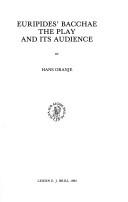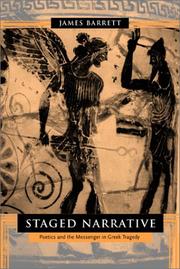| Listing 1 - 3 of 3 |
Sort by
|
Book
ISBN: 9781905670130 1905670133 Year: 2007 Volume: 99 Publisher: London: University of London. Institute of classical studies,
Abstract | Keywords | Export | Availability | Bookmark
 Loading...
Loading...Choose an application
- Reference Manager
- EndNote
- RefWorks (Direct export to RefWorks)
Bacchantes in literature. --- Greek drama (Tragedy) --- Bacchantes dans la littérature --- Tragédie grecque --- History and criticism. --- Histoire et critique --- Euripides. --- Characters. --- Self in literature --- History and criticism --- Euripides --- Criticism and interpretation --- Bacchantes dans la littérature --- Tragédie grecque --- Greek drama (Tragedy) - History and criticism --- Euripides - Criticism and interpretation --- Euripides. - Bacchae

ISBN: 9004070117 900432805X 9789004070110 Year: 1984 Volume: 78 Publisher: Leiden: Brill,
Abstract | Keywords | Export | Availability | Bookmark
 Loading...
Loading...Choose an application
- Reference Manager
- EndNote
- RefWorks (Direct export to RefWorks)
The purpose of this book is to investigate what it was Euripides intended to convey to the theatre-going public of his day when he wrote his most exciting and most gruesome play, the Bacchae . The meanings which are to be attached to the action of a play are woven by an audience, both during and after the performance, into a single dramatic experience, labelled in this book as 'audience response'. After some introductory chapters dealing with the history of the interpretation of the Bacchae and with the theory of audience response, the main part of the book is devoted to a detailed analysis of the action of the play (chapters 4 and 5), and to a study of Dionysus in his various apects in Athenian life and in his appearances in earlier literature and on the tragic stage. The discussion of the choruses concentrates on the choruses' repeated utterances about cleverness and wisdom, which form the core of the Dionysian propaganda of the play. The most immediate results of this new interpretation of the Bacchae are that the widely-accepted view of Pentheus as a dark puritan, a man possessed by the Dionysian qualities of his divine opponent, proves to be untenable, and that that which in the past has been rightly called the overriding theme of the play - the god's epiphany - also contains the poet's most serious and ironical discussion of divinity and of man's treatment of it. The problems of the Greek text are given full discussion, mainly in the nots and appendices. In many cases new solutions are proposed; some new problems are however added.
Euripides --- Dionysos (Divinité grecque) dans la littérature --- Dionysus (Greek deity) in literature --- Dionysus (Griekse godheid) in de literatuur --- Greek drama (Tragedy) --- Bacchantes in literature --- Theater audiences --- Pentheus (Greek mythology) in literature --- Tragédie grecque --- Bacchantes dans la littérature --- Théâtre --- Penthée (Mythologie grecque) dans la littérature --- History and criticism --- History --- Histoire et critique --- Publics --- Histoire --- Euripides. --- Theater --- Pentheus, --- In literature --- -Theater audiences --- -Audiences, Theater --- Theatergoers --- Performing arts --- Theater attendance --- Dramatics --- Histrionics --- Professional theater --- Stage --- Theatre --- Acting --- Actors --- -Audiences --- Audiences --- -History --- -Euripides --- Euripide --- Tragédie grecque --- Bacchantes dans la littérature --- Dionysos (Divinité grecque) dans la littérature --- Théâtre --- Penthée (Mythologie grecque) dans la littérature --- Audiences, Theater --- Dionysus --- In literature. --- Bacchantes in literature. --- Literature. --- Theater. --- Theater audiences. --- Belles-lettres --- Western literature (Western countries) --- World literature --- Authors --- Authorship --- Penthée, --- Tentheus, --- Bacchus --- Bakchos --- Dionís --- Dionisas --- Dioniso --- Dionīss --- Dionisu --- Dioniz --- Dionizi --- Dionizo --- Dionizos --- Dionüszosz --- Dionysos --- Dionýzos --- Diyonizosse --- Πενθεύς, --- Τενθεύς, --- Διόνυσος --- Дионис --- ديونيسوس --- 디오니소스 --- דיוניסוס --- ディオニューソス --- 狄俄倪索斯 --- Βάκχος --- Діоніс --- Bacchae (Euripides) --- Bacchantes (Euripides) --- To 1500 --- Greece. --- al-Yūnān --- Ancient Greece --- Ellada --- Ellas --- Ellēnikē Dēmokratia --- Elliniki Dimokratia --- Grčija --- Grèce --- Grecia --- Gret͡sii͡ --- Griechenland --- Hellada --- Hellas --- Hellenic Republic --- Hellēnikē Dēmokratia --- Kingdom of Greece --- République hellénique --- Royaume de Grèce --- Vasileion tēs Hellados --- Xila --- Yaṿan --- Yūnān --- Philology --- Theater - History - To 500 --- Euripides - Bacchae --- Pentheus, - King of Thebes (Mythological character) - In literature --- Pentheus, - King of Thebes (Mythological character)

ISBN: 0520231805 0520927931 9786612356582 1282356585 159734916X 9780520927933 0585419647 9780585419640 9780520231801 9781597349161 6612356588 9781282356580 Year: 2002 Publisher: Berkeley University of California Press
Abstract | Keywords | Export | Availability | Bookmark
 Loading...
Loading...Choose an application
- Reference Manager
- EndNote
- RefWorks (Direct export to RefWorks)
The messenger who reports important action that has occurred offstage is a familiar inhabitant of Greek tragedy. A messenger informs us about the death of Jocasta and the blinding of Oedipus, the madness of Heracles, the slaughter of Aigisthos, and the death of Hippolytus, among other important events. Despite its prevalence, this conventional figure remains only little understood. Combining several critical approaches-narrative theory, genre study, and rhetorical analysis-this lucid study develops a synthetic view of the messenger of Greek tragedy, showing how this role illuminates some of the genre's most persistent concerns, especially those relating to language, knowledge, and the workings of tragic theater itself. James Barrett gives close readings of several plays including Aeschylus's Persians, Sophocles' Electra and Oedipus Tyrannus, and Euripides' Bacchae and Rhesos. He traces the literary ancestry of the tragic messenger, showing that the messenger's narrative constitutes an unexplored site of engagement with Homeric epic, and that the role illuminates fifth-century b.c. experimentation with modes of speech. Breaking new ground in the study of Athenian tragedy, Barrett deepens our understanding of many central texts and of a form of theater that highlights the fragility and limits of human knowledge, a theme explored by its use of the messenger.
Greek drama (Tragedy) --- Messengers in literature. --- Narration (Rhetoric) --- Rhetoric, Ancient. --- History and criticism. --- History --- -Messengers in literature --- Rhetoric, Ancient --- Classical languages --- Greek language --- Greek rhetoric --- Latin language --- Latin rhetoric --- Narrative (Rhetoric) --- Narrative writing --- Rhetoric --- Discourse analysis, Narrative --- Narratees (Rhetoric) --- History and criticism --- Tragédie grecque --- Messagers dans la littérature --- Narration --- Rhétorique ancienne --- Histoire et critique --- Ancient rhetoric --- Messengers in literature --- achilles. --- aeschylus. --- ancient greece. --- ancient world. --- arete. --- athenian tragedy. --- bacchae. --- classicism. --- drama. --- electra. --- epic. --- epistemology. --- euripides. --- genre study. --- gods and goddesses. --- greek tragedy. --- hellenism. --- homer. --- homeric epic. --- hubris. --- human knowledge. --- literary ancestry. --- literary criticism. --- literature. --- messenger. --- mythology. --- narrative poetics. --- narrative theory. --- nonfiction. --- oedipus rex. --- oedipus tyrannus. --- oedipus. --- performing arts. --- persians. --- poetry. --- rhesos. --- rhetoric. --- rhetorical analysis. --- sophocles. --- theater. --- tragedy. --- tragic messenger.
| Listing 1 - 3 of 3 |
Sort by
|

 Search
Search Feedback
Feedback About UniCat
About UniCat  Help
Help News
News